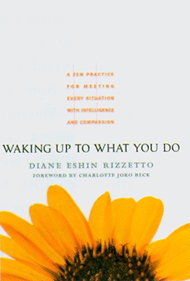 Waking Up to What You Do
Waking Up to What You Do
Diane Eshin Rizzetto
Boston: Shambhala Publications, 2005
197 pp.; $21.95 (cloth)
A story is told of Napoleon and a pauper, that the great general was parading through a small village, promising a duchy to this man and a castle to that one, when the little fellow piped up and asked for a bit of bread.
“That’s all?” says the general with a cock of the head.“Pourquoi?”
“Tiens!” goes the hayseed. “Whether these citizens get their villas and vineyards, your honor, I can’t say—but here comes your adjutant with my bun.”
Diane Eshin Rizzetto has written a fine and readable book about the fundamental practice of Buddhism. If Waking Up to What You Do is short on castles and duchies, it’s full of buns. It’s Zen all right, but where’s the talk of perfect enlightenment? Where are the ecstasies at the sound of bamboo clacking in the wind or the moon in somebody’s bucket? Rizzetto is mostly content to show us without fanfare just what’s in front of our nose—or up it. We are enjoined to witness and work with the unpleasantness that comprises the better part of our little lives: fixating on a co-worker’s slight, bemoaning a perfidious government, dealing with cancer, dealing with death, dealing with injured pride. She takes seriously, as few of us like to, Truth Number One of the Buddhist canon: There’s suffering.
Rizzetto illuminates her teaching with students’ personal anecdotes, questions, and insights, and is not shy about sharing her own confusions and shortcomings. Her account of her own checkered past as a rebellious teen mother is endearingly candid.
The vehicles for her study are the Buddhist precepts, and here’s a rub: how to avoid the traps of piety and moralism—the ramrod neck in a monk’s starched collar, the list-checker’s anal consolations? Rizzetto wisely reframes the traditional proscriptions as invitations to a larger, freer life. Here, for example, is her rendition of the precept against misusing sexuality (originally, for monastics, against sex, period): “I take up the way of engaging in sexual intimacy respectfully and with an open heart.” In fact, the most impressive thing about this book is its constant emphasis on Buddhism not as a practice of morality or of knowledge but of awareness: if you come away knowing things and being a better person, well and good, but the point is just to be there, not in any transcendental sense, but plainly and simply.
The method, systematically laid out, is one of observation and inquiry. We are enjoined to witness our moments of passion and displeasure, to observe without judgment, to let physical sensations, ringing thoughts, and welling emotions inform us rather than rule us. There’s a saying in the Mahayana sutras: “The Buddha sees the essence of all beings with his physical eye.” The technique of the Ordinary Mind School of which Rizzetto is a member (along with founder Charlotte Joko Beck, Ezra Bayda, and others) is a perfect embodiment of the idea of that saying. Or as Toni Packer likes to put it: “The seeing is the cutting.” There is no sublime additional goal.
Buns, not duchies.
You might say it’s a case of Gurdjieff meets Gendlin. Rizzetto aims us toward something very much like the curative “felt sense” cultivated by practitioners of psychotherapist Eugene Gendlin’s “focusing,” while the exercises she recommends, thrusting us into the midst of our personal difficulties, are not unlike the challenges George Gurdjieff gave his students (or would-be students).
But isn’t this (mere) psychology rather than religion? Some time ago Zen teacher Robert Aitken seemed to slight Beck’s methodology as (mere) psychologizing or “pre-Zen.” There was a bit of flack, and Aitken sincerely apologized. No harm done: nowadays he blurbs her. The tension, however, is there. Some Zen folks declaim this style of practice as “Bompu Zen,” a mental health regime, and they look down their Zen noses at it. But do they, in the shadow of Napoleon’s horse, dreaming of castles and duchies, see those noses? (Not for nothing did Hakuin paint Bodhidharma cross-eyed.)
As to our pauper, no Versailles Palace is worth one lick of that bun. And the taste is not perfect enlightenment or bamboo-clack ecstasies, thank you very much—it’s bun.
Thank you for subscribing to Tricycle! As a nonprofit, we depend on readers like you to keep Buddhist teachings and practices widely available.